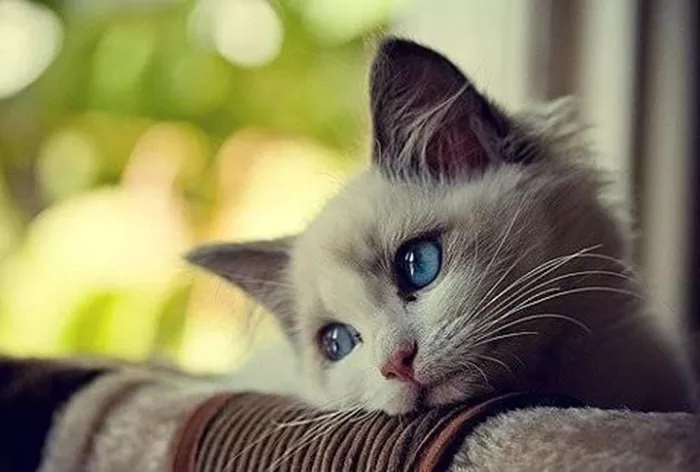Is Your Kitten Depressed? Just like humans, kittens can experience emotional and psychological challenges. While it’s less commonly discussed than physical health, mental wellbeing is crucial for the overall health and happiness of your feline friend. As a pet owner, you might notice changes in your kitten’s behavior and wonder whether they could be signs of depression. This article delves into understanding feline depression, identifying its symptoms, and offering practical solutions to help your kitten thrive.
The Importance of Mental Health in Kittens
1. The Nature of Kitten Behavior
Kittens, like humans, are not immune to emotional distress. Unlike adult cats who might hide their feelings better, kittens are more transparent about their needs and emotions. Understanding normal kitten behavior is crucial to identifying when something is wrong. A healthy kitten is usually active, curious, and playful, displaying a healthy appetite and engaging with both people and toys.
2. The Role of Environment in Mental Health
The environment plays a significant role in a kitten’s mental health. Stressful changes, such as moving to a new home, changes in the household, or the introduction of new pets, can affect a kitten’s emotional state. The mental wellbeing of a kitten is often intertwined with their physical environment, social interactions, and overall life experiences.
See Also:Does Going Out Help Depression?
3. Common Causes of Feline Depression
Understanding what can trigger depression in kittens is essential for effective intervention. Here are some common causes:
1. Changes in Environment: Moving to a new home or rearranging furniture can be stressful for kittens.
2. Lack of Socialization: Kittens that haven’t been properly socialized may experience anxiety and depression.
3. Illness or Pain: Undiagnosed health issues can cause a kitten to withdraw or show signs of depression.
4. Trauma: Experiences such as abuse or rough handling can lead to emotional distress.
5. Loss of Companionship: The loss of a fellow pet or a family member can deeply affect a kitten.
Identifying Depression in Kittens
1. Behavioral Changes
Changes in behavior are often the first indicators of depression. Key signs to watch for include:
1. Decreased Activity: A once playful kitten may become lethargic, spending more time hiding or sleeping.
2. Loss of Appetite: A reduction in eating or drinking can indicate that a kitten is not feeling well emotionally.
3. Changes in Grooming: Overgrooming or neglecting grooming can be a sign of distress.
4. Aggression or Withdrawal: A depressed kitten may become more aggressive or withdrawn, avoiding interaction with family members or other pets.
2. Physical Symptoms
Depression can also manifest in physical symptoms:
1. Weight Loss: Prolonged lack of appetite can lead to significant weight loss.
2. Poor Coat Condition: A lack of grooming can result in a dull, unkempt coat.
3. Frequent Illness: Stress and depression can weaken the immune system, making kittens more susceptible to infections.
Practical Solutions for Addressing Kitten Depression
1. Create a Safe and Stimulating Environment
A stimulating environment helps combat boredom and stress:
1. Provide Toys: Interactive toys and scratching posts can keep your kitten engaged and physically active.
2. Safe Spaces: Create cozy, quiet areas where your kitten can retreat when they need to relax.
3. Consistent Routine: Establish a regular feeding and playtime schedule to provide stability.
2. Socialization and Interaction
Proper socialization is crucial for a kitten’s mental health:
1. Gentle Handling: Regular, gentle handling can help your kitten feel more secure and build trust.
2. Positive Reinforcement: Use treats and praise to encourage positive behaviors and interactions.
3. Social Play: Engage in interactive play sessions to strengthen your bond and provide mental stimulation.
3. Addressing Health Concerns
If you suspect that health issues are affecting your kitten’s behavior:
1. Veterinary CheckUp: Schedule a visit with your veterinarian to rule out underlying health problems.
2. Pain Management: If pain or illness is diagnosed, follow your vet’s recommendations for treatment and pain management.
3. Monitor Changes: Keep track of any behavioral changes and share them with your vet for a more accurate diagnosis.
4. Professional Help
In cases where depression persists or is severe:
1. Consult a Veterinary Behaviorist: A specialist can provide tailored advice and treatment plans.
2. Behavioral Therapy: Professional behavioral therapy can address complex behavioral issues and help improve your kitten’s mental health.
Case Studies and RealLife Examples
1. Example of a Stressful Move
When Mia moved to a new house, her kitten, Oliver, exhibited signs of depression, including withdrawal and loss of appetite. Mia addressed the issue by creating a calm environment with familiar toys and bedding, maintaining a consistent routine, and spending extra time playing with Oliver. Over time, Oliver adjusted to the new environment and his symptoms improved.
2. Example of Socialization Issues
Luna was a kitten that was not wellsocialized before being adopted. She displayed aggressive behavior and fearfulness towards people. Her new owner worked with a feline behaviorist to gradually introduce her to new experiences and people, using positive reinforcement techniques. Luna’s behavior improved significantly as she became more comfortable and confident.
Conclusion
Understanding and addressing depression in kittens is essential for their overall wellbeing. By recognizing the signs of depression and taking proactive steps to create a supportive environment, provide social interaction, and seek professional help when necessary, you can help your kitten lead a happy and healthy life. Remember, your kitten’s mental health is just as important as their physical health, and addressing it with compassion and care can make all the difference.
Related articles:
Depression What Causes It?
Are Constant Headaches a Sign of Depression?
Is Eating Less a Sign of Depression?


